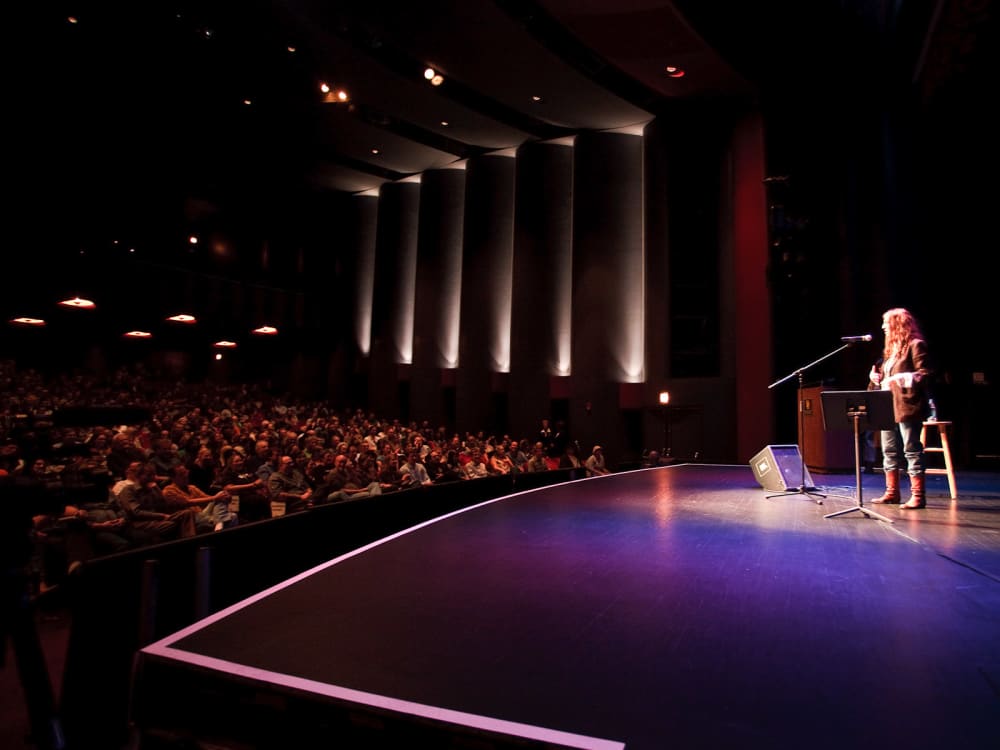Michael Stipe's American Idol
Patti Smith shows Houston she's still a force — in story & song
 Patti Smith performs a short selection of songs at the University of Houston'sE. Cullen Performance Hall. Her appearance was sponsored by Voices BreakingBoundaries.Photo by Eric Hester
Patti Smith performs a short selection of songs at the University of Houston'sE. Cullen Performance Hall. Her appearance was sponsored by Voices BreakingBoundaries.Photo by Eric Hester Patti Smith reads from her memoir, "Just Kids," which chronicles hercoming-of-age, her relationship with artist Robert Mapplethorpe and their riseto fame.Photo by Eric Hester
Patti Smith reads from her memoir, "Just Kids," which chronicles hercoming-of-age, her relationship with artist Robert Mapplethorpe and their riseto fame.Photo by Eric Hester The crowd at E. Cullen Performance HallPhoto by Eric Hester
The crowd at E. Cullen Performance HallPhoto by Eric Hester
Patti Smith burst on the scene seemingly fully formed in 1975 with Horses, one of rock music's most electrifying debuts. R.E.M.'s Michael Stipe bought the album as a high school student and says it "tore my limbs off and put them back on in a whole different order."
"Jesus died for somebody's sins, but not mine," Smith defiantly moaned to open the record, this a full two years before punk rock exploded into the consciousness of disaffected youth across the globe.
The talent on display on Horses is of the highest order, but in Smith's new memoir, Just Kids, she makes it clear that her craft had to be nurtured for many years before it was ready to shatter boundaries and captivate the world. What makes the book such an absorbing read is the candor and tenderness with which Smith documents her early years in New York City, when she and best friend (and former lover) Robert Mapplethorpe trawled the streets in search of inspiration.
Smith was in town last night to read from "Just Kids," and the full house at University of Houston's Cullen Theater listened to her recount stories from her memoir, sing a few songs, and answer questions from the adoring crowd. Soft spoken, funny and warm, Smith is equally adept as an orator as she is a singer. Even with a thousand other people in the room, it felt like an intimate meeting with a great artist.
Living in the Chelsea Hotel in the late 1960s, with the ghosts of Dylan (both Thomas and Bob) haunting the hallways and a young crop of writers, poets, musicians, and artists as neighbors, Smith and Mapplethorpe started their ascent, "a prelude to fame."
"It was the summer Coltrane died. The summer of "Crystal Ship." Flower children raised their empty arms and China exploded the H-bomb. Jimi Hendrix set his guitar in flames in Monterey. A.M. radio played "Ode to Billy Joe." There were riots in Newark, Milwaukee, and Detroit. It was the summer of Elvira Madigan, the summer of love. And in this shifting, inhospitable atmosphere, a chance encounter changed the course of my life.
It was the summer I met Robert Mapplethorpe."
A highlight of the Houston reading, presented by Voices Breaking Boundaries, included the story about her first meeting with Allen Ginsberg, one of her heroes, during a chance encounter outside an automat on West 23rd Street. The legendary poet fronted Smith 10 cents for the remaining cost of her cheese and mustard sandwich and a cup of coffee, but did so only after mistaking the young upstart for a "very pretty boy."
The audience was also treated to recollections of exploring Chinatown with poet Jim Carroll and explanations of the inspirations behind a few of her classic songs. "Piss Factory" refers to the bathroom at a factory Smith worked in as a teen where she was threatened to be stuffed in a toilet for reading Rimbaud, who was feared to be a Communist by her co-workers because they mistook the French for Russian."Dancing Barefoot" was described as a mystical love song dedicated to her late husband, Fred "Sonic" Smith.
The music portion of the evening proved to be the most rousing, with Smith turning in spare, but powerful renditions of "Wing" and "Grateful." Cullen Hall reached a fever pitch during a sing-a-long acapella version of Smith's biggest hit, "Because the Night." With the crowd joining in what Smith called a "scientific experiment," the 1978 single was given a new life as a chorus of a thousand sang, clapped, whooped and hollered along to the anthem.
Ever the gracious guest, Smith praised Houston for its hospitality, gave shout-outs to the Brazos Bookstore and the Rothko Chapel ("It's one of my favorite places on Earth," she gushed about the Rothko) and promised to return soon.
